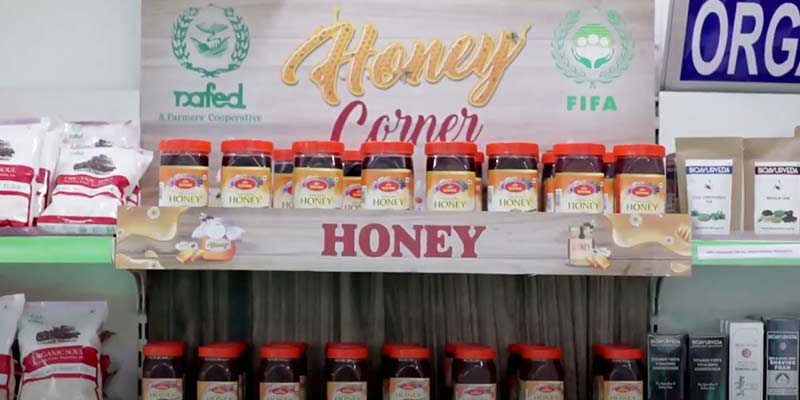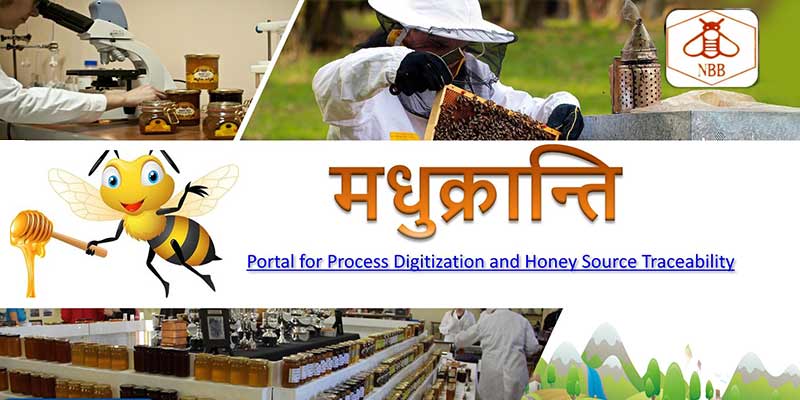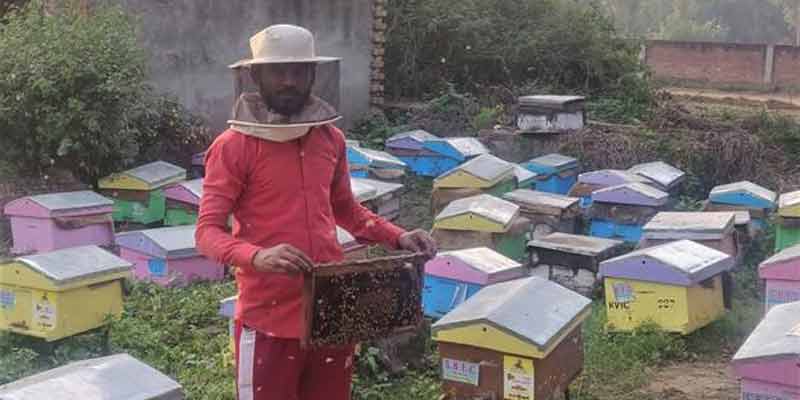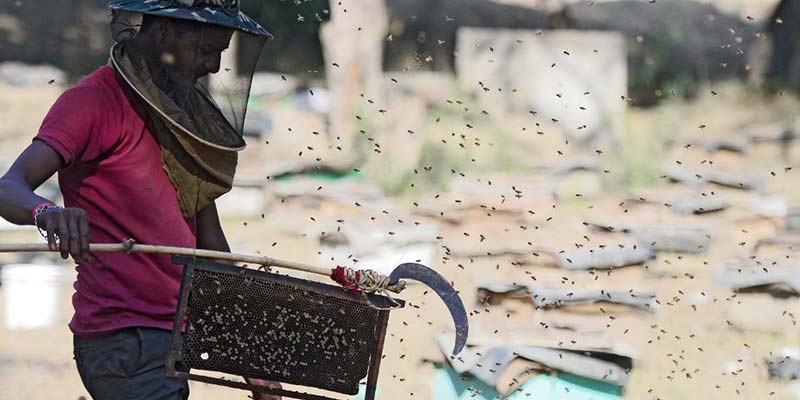- India
- Apr 08
Govt launches portal for traceability of source of honey
Union Agriculture Minister Narendra Singh Tomar launched a portal for online registration to achieve a traceability system in sourcing of honey and other beehive products, as part of the government’s effort to ensure quality and check adulteration.
The minister launched the online platform ‘Madhukranti’, which is an initiative of the National Bee Board (NBB) under the National Beekeeping and Honey Mission (NBHM).
He also launched NAFED’s ‘Honey Corners’, which are special spaces for sale of honey.
Madhukranti portal
This portal is developed for online registration to achieve traceability of honey and other beehive products on a digital platform.
The technical and banking partner for development of this digital platform is Indian Bank. An MoU between NBB and Indian Bank was signed for this project.
Online registration/traceability system for source of honey and other beehive products will help in checking the quality and source of adulteration of honey. The system will also enable consumers/public to know the source of honey and assure quality of the products.
Necessary functionalities are being developed on the portal to create a database of all stakeholders involved in honey and other hive products’ production, sales and marketing chain. Online registration of beekeepers was launched in the first phase, followed by registration of other stakeholders in this trade.
All sales transactions in honey trading in the country shall be captured through a mobile app in the second phase to achieve desired results in the area of source traceability.
Honey Corners
For marketing support to the Farmer Producer Organisations (FPOs), NAFED has developed 14-15 Honey Corners, one each in five NAFED Bazaars at Ashram, New Moti Bagh and East of Kailash, Panchkula and Mussoorie.
More Honey Corners will be developed by NAFED in most of the upcoming major 200 NAFED stores to promote market support for honey and other beehive products.
Online marketing options will be explored to provide a platform for marketing and promotion of honey supplied by the FPOs.
The ministry has been making efforts to address issues relating to quality of honey through setting up of quality testing labs and online registration/developing traceability system for source of honey and other beehive products under NBHM.
Sweet Revolution
Beekeeping is an agro-based activity which is being undertaken by farmers/landless labourers in rural areas as a part of Integrated Farming System (IFS). Beekeeping has been useful in pollination of crops, thereby, increasing income of the farmers/beekeepers by way of increasing crop yield and providing honey and other high value beehive products. Diversified agro climatic conditions of India provide great potential and opportunities for beekeeping, honey production and export of honey.
Following the call for a ‘Sweet Revolution’ by PM Narendra Modi in 2017, the government has been encouraging large numbers of farmers for production and marketing of honey and earn more profit in agriculture.
Keeping in view the importance of beekeeping as part of the Integrated Farming System in the country, the Centre approved Rs 500 crore for National Beekeeping & Honey Mission (NBHM) for three years (2020-21 to 2022-23). The mission was announced as part of the ‘Atmanirbhar Bharat’ initiative.
National Beekeeping and Honey Mission
National Beekeeping and Honey Mission (NBHM) is a central sector scheme for overall promotion and development of scientific beekeeping and production of quality honey and other beehive products.
NBHM aims for the overall promotion & development of scientific beekeeping in the country to achieve the goal of ‘Sweet Revolution’ which is being implemented by the National Bee Board (NBB).
It has three Mini Missions:
1) Mini Mission-I: Under this Mission, thrust will be given on production and productivity improvement of various crops through pollination assisted by adoption of scientific beekeeping.
2) Mini Mission-II: This Mission will concentrate on post harvest management of beekeeping/ beehive products including collection, processing, storage, marketing, value addition, etc with a thrust to develop requisite infrastructural facilities for these activities
3) Mini Mission-III: This Mission will concentrate on research & technology generation for different regions/states/agro-climatic and socio-economic conditions.
Objectives of NBHM:
* Promoting holistic growth of the beekeeping industry for income and employment generation, providing livelihood support to farm and non-farm households and to enhance agriculture/ horticulture production.
* Developing additional infrastructural facilities for developing quality nucleus stock of honey bees, multiplication of stock by bee breeders, setting up of disease diagnostic labs, beekeeping equipment manufacturing units, post-harvest and marketing infrastructures including quality control labs individually as well as by setting up of Integrated Beekeeping Development Centres (IBDCs)/ Centres of Excellence (CoEs) on Beekeeping.
* To promote, develop and disseminate latest and state-of-the-art technologies and skill development in the beekeeping industry for production of honey and other high value beehive products.
* Empowerment of women through beekeeping.
* To maximise, economic, ecological and social benefits by diversification through beekeeping by production of higher quantity and good quality honey and other high value beehive products, such as bee wax, bee pollen, propolis, royal jelly, comb honey, bee venom, etc for domestic and export market.
Achievements of NBB under Honey Mission:
• Inaugurated state-of-the-art honey testing lab at the National Dairy Development Board (NDDB) in Anand district of Gujarat on July 24, 2020.
• The Food Safety and Standards Authority of India (FSSAI) notified a new testing method related to honey standards wherein it has decided to reinstate the Specific Marker for Rice Syrup (SMR) test. This parameter is said to detect even a slight presence of syrups in the final product. It also reinstated Foreign Oligosaccharides parameter in the standard of honey.
• Till date, 45 projects for assistance of Rs 88.87 crore have been approved/sanctioned for funding under NBHM, including distribution of specialised beekeeping equipment for production of high value products, in-house testing labs, collection, trading, branding & marketing centres, storages, etc.
• Among others, it has been decided to set up 100 mini and four or five regional/big honey & other beehive products testing labs in three years.
• 70 FPOs of beekeeper/honey producers, including 65 by NABARD & others and five by NAFED in Bihar, Uttar Pradesh, Madhya Pradesh, Rajasthan & West Bengal have been formed.
• Roadmap for collaboration with National Highways Authority of India (NHAI) for plantation of bee friendly flora on roadsides & promoting beekeeping is being made.
• Honey production has increased from 76,150 MTs (2013-14) to 1,20,000 MTs (2019-20).
• Export of honey has increased from 28,378.42 MTs (2013-14) to 59,536.74 MTs (2019-20).
• 29 bee breeders have been developed for multiplication/production of quality honeybee colonies along with queens for providing to the trained farmers/beekeepers. Each bee breeder produces at least 2,000 bee colonies every year.
• 10,000 beekeepers/beekeeping & honey societies/firms/companies with 16 lakh honeybee colonies registered with NBB are uploaded on Madhukranti portal.
• 16 Integrated Beekeeping Development Centres (IBDCs) as role models of beekeeping have been commissioned, one each in Haryana, Delhi, Bihar, Punjab, Madhya Pradesh, Uttar Pradesh, Manipur, Uttarakhand, Jammu & Kashmir, Tamil Nadu, Karnataka, Himachal Pradesh, West Bengal, Tripura, Andhra Pradesh and Arunachal Pradesh.
Manorama Yearbook app is now available on Google Play Store and iOS App Store




